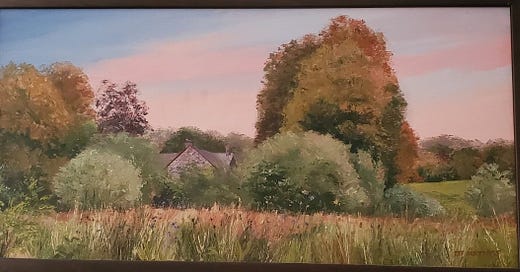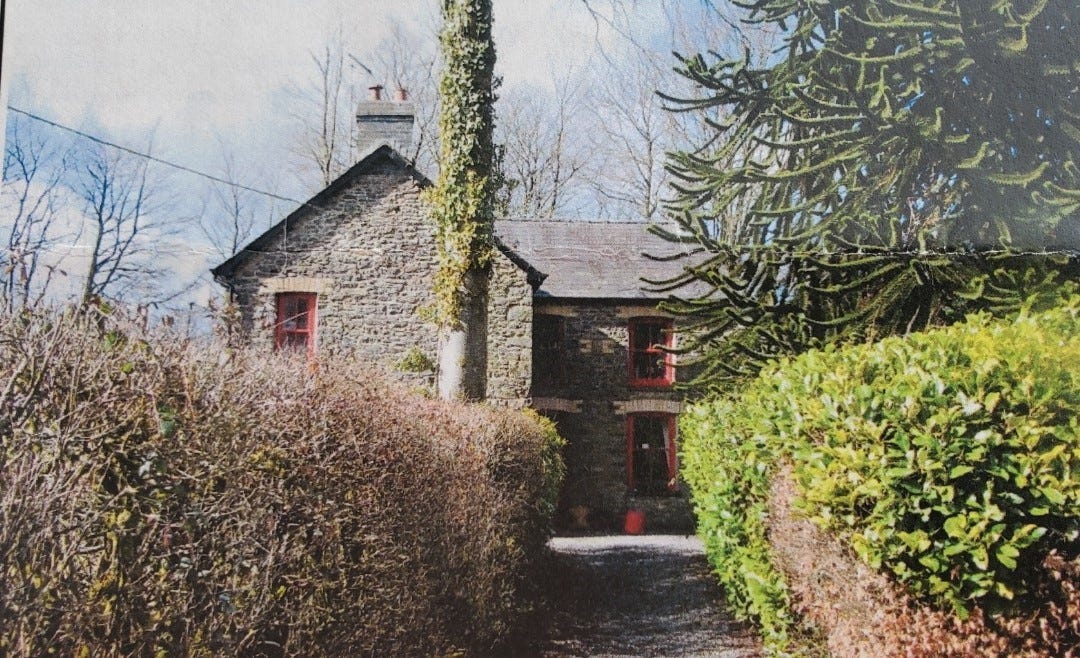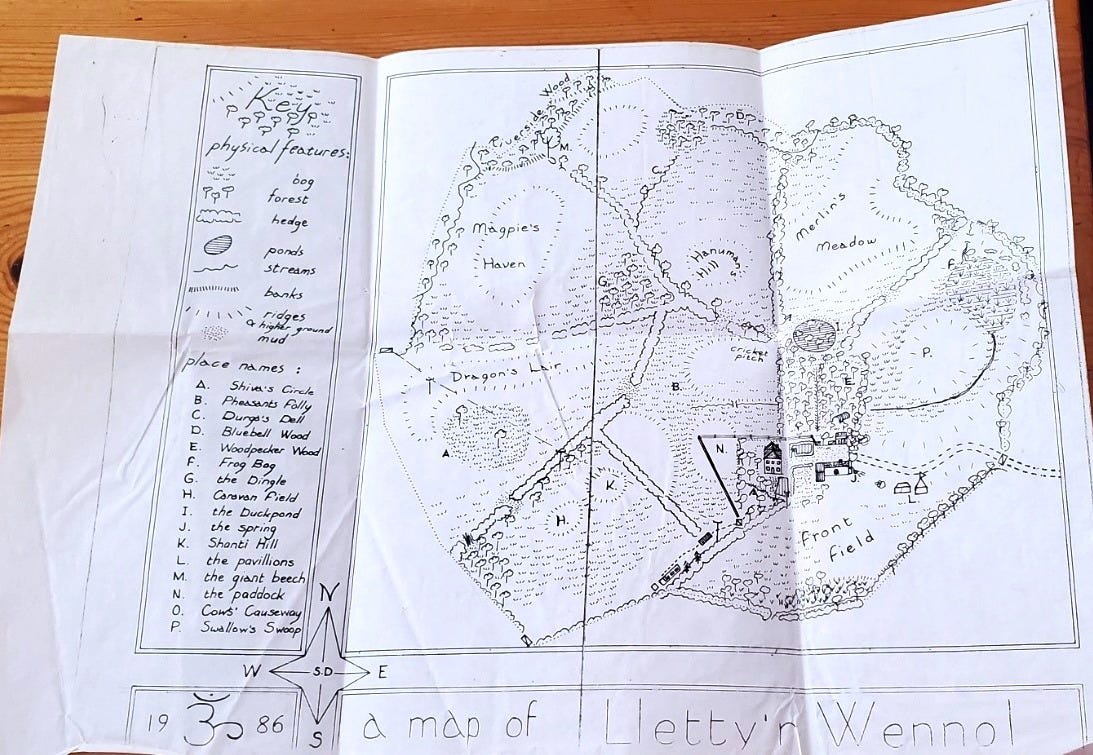I knew we would live there the moment I saw Llety’r Wennol. Something in me recognised the house, the monkey puzzle tree and laurel hedges. It felt like home.
It was an inner knowing, a voice that I have learned to listen to in my life. Something akin to intuition, or genetic memory, or Deja-vu, sometimes accompanied by cold shivers, or a simple feeling of rightness, of harmony. Maybe it’s a magical alignment of destiny and time, a cosmic hint that I’m on the right track.
We’d driven through a pool of slurry and along a half-mile bumpy track to get there. The house was surrounded by mature trees, in the centre of eighteen acres of wild Welsh land, divided into nine fields. All I could hear, as I stood in the yard, was the celebration of birdsong and the silver notes of running water. Peace and stillness settled over me and I breathed in deeply—the sense of home-coming intensified.
The farmhouse kitchen had a wood-beamed ceiling, with a pulley to hoist the fatted pig, which fed a family all winter, and a cast iron swivel and hook in the hearth, for boiling kettles and cooking cawl. There was electricity, but no running water. An underground spring provided a steady stream of pure, cold water.
Llety’r Wennol means ‘home of the swallows.’ We were the swallows, and we had found our home. We moved in on the seventh day of the seventh month in the seventy seventh year of the twentieth century, with our three children, aged seven-months, almost four, and six. We lived there for thirty-eight years. Llety’r Wennol was my dream home. I still feel hiraeth* for it, and know I always will.
I can close my eyes now and hear the woodpecker knocking in the beechwoods, the cuckoo calling across meadowsweet field. I can see myself walking the land, drinking in the red-tipped sorrel, wild orchid and marsh marigold, standing beneath the ancient oak, finding the secret dells where bluebells bloom, sitting beside the stream as it trills over time-smoothed stone, under lichen-limbed elder and crack willow.
We didn’t farm Llety’r Wennol. We grew vegetables and I built a rose garden. We tried potato farming one year, but they caught the blight and turned to slime. We were busy running our wholefood shop, and knew we were care-takers of this parcel of wilderness. Our role was to let nature do what she wished with it. We called it our frog sanctuary, and every year the ponds and pools would be wriggling with tadpoles, the grass alive with croaks and ribbits. The earth was full of quartz, and I fantasised about a crystal cave beneath the garden, holding the secrets of time.
I heard my inner voice one stormy night in London, in the mid-sixties, telling me that Smudger would be the man I married. I really didn’t want to hear that, and ignored it for years. He was a friend, yes, but I didn’t even want to marry, and had never thought of him that way. Several years later he told me that he had also known we would be together on that night. He too had tried to ignore it.
We have been partners for fifty-seven years. Hand in hand we’ve travelled through life. We are completely different, polar opposites in fact, yet we complement one another, like two pieces of a jigsaw, we fit together perfectly. He drives me crazy at times, and I love him. I step over the boundary of organiser to bossiness at times, and he tolerates that, and loves me. He is my rock, and I am his. Our love is like the softest cashmere, or silk on a summer’s day, like tenderness made manifest.
His heart is like crystal—luminous and pure; his voice still like velvet, his music like wine—rich, nourishing, full-bodied with soul. We are soul-mates, he and I, destined to travel this life-path together, to face the storms and rejoice in the blessings, to follow our spiritual path, and stay close to the flame.
Smudger and I began our life together travelling overland to Morocco in January 1968. Our first home was in Marrakesh: a single room on the top floor of a three-storied building, built around a central courtyard, which was criss-crossed with washing lines, and full of women and children, talking, playing, working and laughing together. We were the only non-Moroccans living there.
The room was basic, unfurnished, with a blue and white tiled floor and white-washed walls. We bought a rush mat to sleep on, a quilt and pillows for bedding, a clay pot and one pan to cook on.
Our life was simple, peaceful and glorious. We adapted to one another naturally, enjoying long conversations or companionable silence. We are both strong-minded people, so there were inevitable clashes of will, which often erupted into fiery rows, where neither of us was prepared to back down. And every time we made up was like swimming in nectar—sweet, tender and infinitely precious.
We hitched back to the UK, sleeping on rooves and beaches, in a van parked on an upmarket Parisian street. In the following years we changed home every few months: Bushey, London, Skye Island, three homes in Bristol, a caravan on the Welsh borders (with our baby daughter), three houses in Kabul, Winchester, (where our second daughter was born) and finally Wales.
I learned to make a home anywhere. I had a few beautiful pieces, bought flowers, cooked food and settled in with the man I loved and our children.
Llety’r Wennol was where we grew our roots, and I love this land of song, Cymru, with a fierce ache. I have found the home of my heart, the place where the land sings to me of spirit, of the old wisdom that I dreamed fragments of all my life, the place where the threads of love and longing, purpose and connection, creativity and community have woven together to create a shimmering tapestry that enfolds and nourishes me.
Now I am in my third stage of life I have tuned in to my inner voice, and ceased arguing with her. She is the part of me connected to all, and I am still learning to live my life in harmony with her, not at the beck and call of the restless, isolated and selfish desires of the part of me that identifies with ephemeral gratification, praise and blame, popularity and appearance.
I feel content and fulfilled. Happy with who I am, where I am and deeply grateful for my life, my family, my spiritual journey and the ability to write, read, walk and be beside the sea. I have an unquenchable desire for knowledge. Everything fascinates me, and there are so many books I wish to read. I love meditating each morning, the way it makes me feel, the stillness I connect to, and the way that stillness ripples through my days, allowing me to keep my ears, heart and mind open.
I have come home.
What does home mean for you, at this stage of your life?
How do you hear your inner voice? Do you listen, or argue? I would love to hear from you.
Thank you for reading,
With love,
Josie
*Hiraeth is a beautiful, untranslatable word in the Welsh language, which has shades of yearning, nostalgia, homesickness and grief. I understand it as ‘the heart’s longing for home.’






You write so compellingly about listening to the inner prompts. I find that at 73 I am more able than I used to to be to pay attention to what my true self is suggesting. It is easier to pause and consider, "What is that stirring inside? Oh yes, I can trust that! Let's go with that."
It is also so lovely to hear about how you experience the blessings in your life even as you manage all the bumps that come along the way.
Thank you!
Hi Josie you write and read so beautifully. What a beautiful life and homing story. Thank you for mentioning where I might find your work after your lovely poetry last night. 💜